A few people have asked about the verbs I’ve decide to use (or more specifically not use) in my game. To those who don’t know what I’m talking about, it’s the text commands in the bottom-left hand side of the screen (“Look at”, “Pick up” etc.).
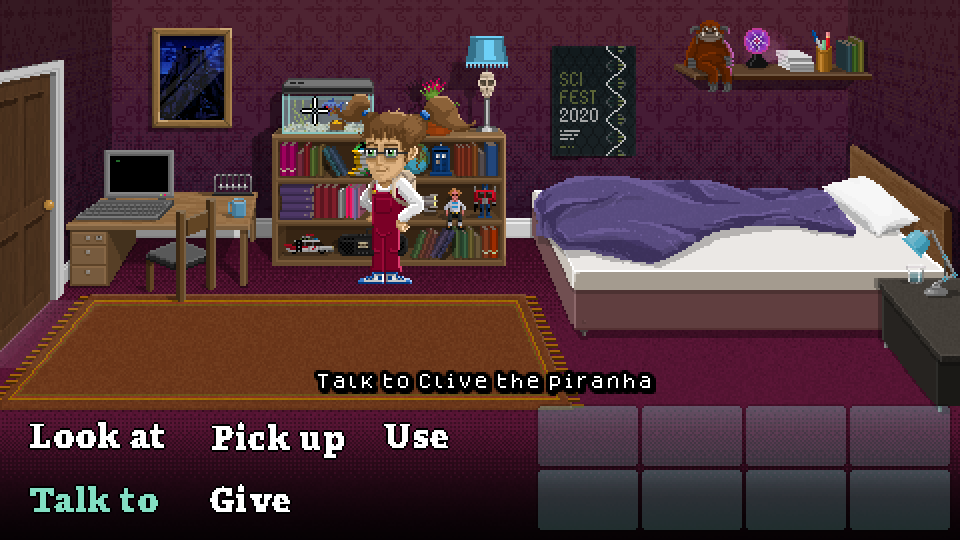
As you can see above, there are only five options. This takes a few people by surprise as in the old-school LucasArts adventure games (and in many others since then, including Thimbleweed Park) there are quite a few more verbs available for players to choose from. Twelve in earlier games which was the then reduced to nine later on.
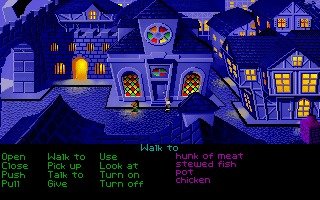
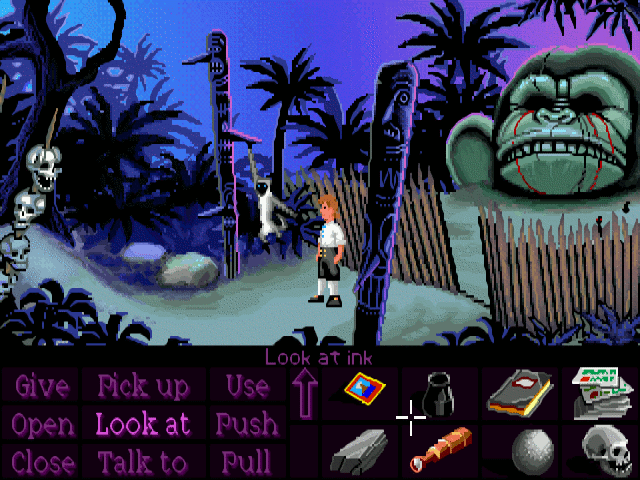
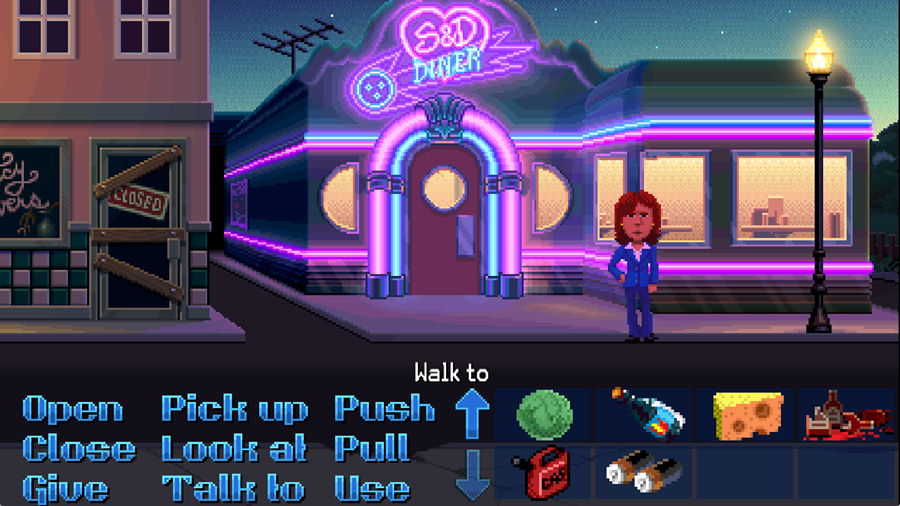
So, who the hell do I think I am to say that Ron Gilbert is wrong and reject all that is good and holy about the games I loved as a child?
The ones I’ve chosen to live without are “Open”, “Close”, “Push” and “Pull”. I’ve personally found that these verbs can almost always be covered by the “Use” command. It’s always pretty obvious what the user needs to do, and the difference between “Push door” and “Pull door”, or even “Push lever” and “Pull lever” is rarely integral to the gameplay.
I’ve not found a puzzle yet that truly necessitates separate ones (or couldn’t be easily re-written to accommodate the single “Use” verb instead). All it really serves to do is to provide more options for a player to get wrong “Damn, pushing the door didn’t work, I’ll have to pull it instead.”. OK, maybe you might want to “Push” someone on a swing or something, and “Use” would certainly sound odd under certain specific circumstances, but you can get around that (maybe trigger the push after talking to the person “Would you like me to push you?”).
In the short-term, under these conditions I agree that having a “Push” command would be the easiest solution to the puzzle, but I believe that the advantages of fewer verbs greatly outweigh these issues which are easily overcome and few and far between.
The way I see it, the original nine verbs are a set of arbitrary hand-me-downs from the early days of SCUMM where they were created to fit specific games and some were rarely used anyway. They could easily have been different (e.g. “Lift” or “Listen to”), but “Use” seems to be the only one which is flexible and ubiquitous enough to do the job of the others. Ultimately the verbs need to fit the game. If you are playing as a bloodhound then a “Sniff” verb makes sense etc. so there’s no real need to copy the verbs from someone else’s game if they don’t fit.
Fewer verbs makes for simpler gameplay for players, with less frustration and guesswork. It’s far less intensive on programming where you often need to come up with different dialogue for each verb on each object in a scene (at least if you want to create a rich and rewarding environment to explore without hearing the default phrases “That doesn’t work.” or “I can’t do that.” on repeat).
But probably even more importantly in a world where games are being played in the palm of a player’s hand, fewer verbs allows for larger, more spaced out buttons which are easier to tap and more accessible forvisually-impaired players.
I’m genuinely open to counter-arguments on this subject (even if it’s just trends and nostalgia), but this is a bit of a rationale behind my decision.
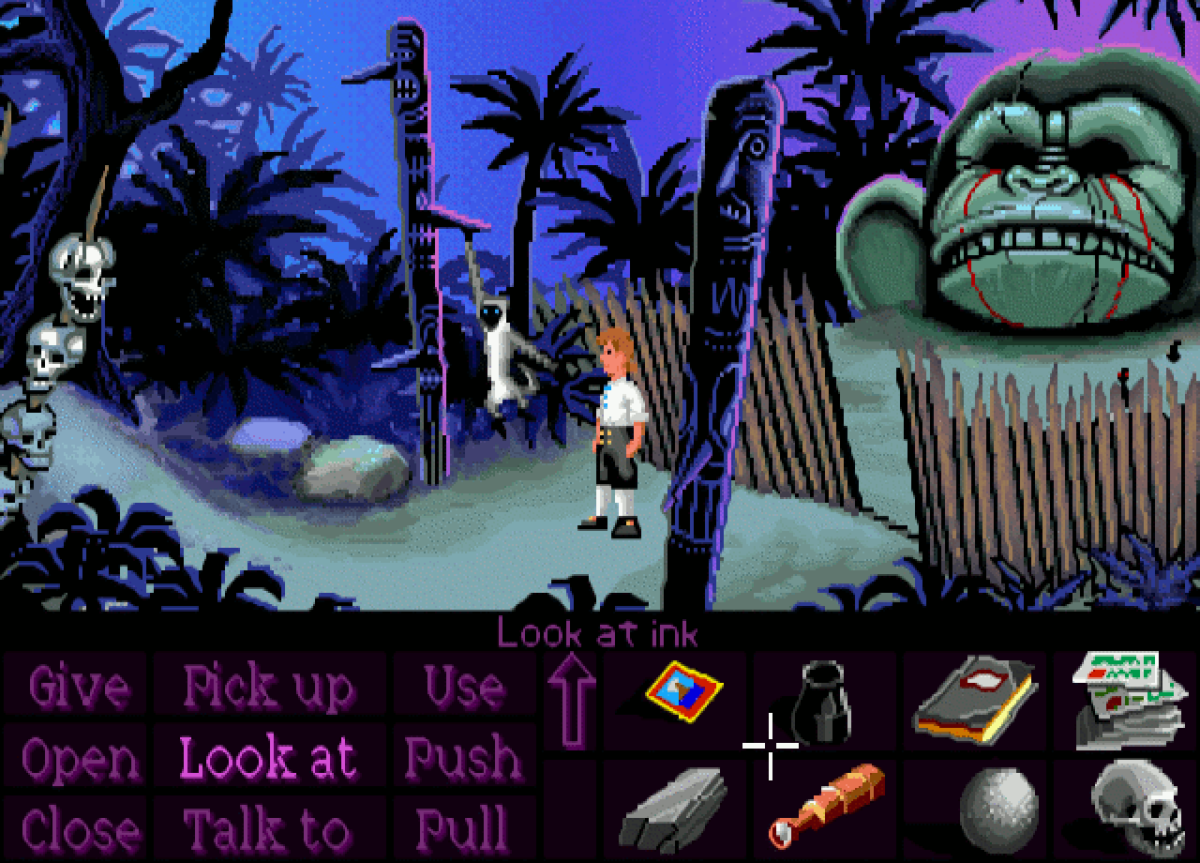
3 replies on “A quick one about verbs”
Probably too late to change, but five verbs with the empty space look wrong, there must be the sixth one.
Thanks for the comment, you’re not alone in saying that. I don’t agree that there necessarily “must” be a sixth verb just to fill up space. Also I’m saving the sixth space for later in the full game (fingers crossed)! ? I am also going to look at rearranging the interface a bit too prior to launch.
The verbs you settled on bring up plenty of nostalgia for me, as someone who didn’t grow up with SCUMM games but played plenty of adventure games from Sierra, Interplay, and others. Back in the text parser days, I remember frustration when poor design meant that the “puzzle” was not what to do, but what verb was correct to accomplish that goal.
I don’t think Ron Gilbert was wrong, contextually. I mean it was pretty unique back in the day to have such an intuitive system – much less intrusive than Sierra’s prolonged use of the text parser for everything they released in the 80s.
But I do think that tradition more than justifiable game design decisions was what kept so many verbs around for so long, and that designers managed to have a lot of fun with variations on a smaller number of verbs. (I remember fondly the Space Quest 6 “verbs” of “foot” “hand” “eye” and “mouth”. Not much required that last one, but it was great comedy fodder!)